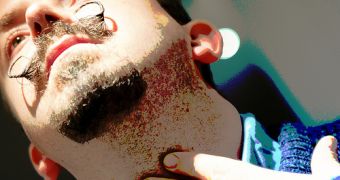Research on the effects of an allergy drug on eosinophilic esophagitis concluded that the drug helped treat the cause of the throat condition but the symptoms remained.
A group of researchers from the Mayo Clinic carried out the first controlled trial of swallowed fluticasone nasal spray, or Flonase, on people suffering from the allergic esophageal condition, called eosinophilic esophagitis.
Their randomized, double-blind study included 34 adults, who were given an aerosolized fluticasone or a placebo twice a day for six weeks.
At the end of the experiment, the subjects were asked to fill in questionnaires to evaluate their symptoms and the side effects of the treatment.
The researchers examined their throats with an endoscope and biopsies were made for the presence of eosinophils (a type of blood cell that produces proteins, which scientists suspect for causing swallowing problems)
Jeffrey Alexander, MD, a Mayo Clinic gastroenterologist and lead author on the study, said that they “had complete histologic remission in 68 percent of the people who took the fluticasone, compared to zero for the placebo.
“From this perspective, fluticasone does get rid of the eosinophils in the esophagus; however, people's symptoms did not improve.”
Basically, the aerosolized swallowed allergy drug treated the cause of the throat condition, but did not affect the symptoms.
Dr. Alexander thinks that there are several factors that explain the lack of symptom improvement: “we had a symptom response in 63 percent of the people, but we had a placebo response in 47 percent of the people, which is very high.
“Our experience in clinical practice is that the symptoms do get better,” he said.
“We suspect the lack of symptom response was related to difficulty in assessing intermittent swallowing symptoms with our questionnaire.”
Eosinophilic esophagitis is a new disease, and it was first noticed in young people; it gives those who suffer from it, the impression to have solid food sticking in their throat or heartburn sensations.
Normally, the treatment involves a steroid applied to the esophagus but this method has no scientific base.
Fluticasone is a compound used in inhalers and as a nasal spray to treat allergic inflammation in the lungs and sinuses.
It is a corticosteroid that relieves irritation and swelling and it also allows asthmatic people to breathe easier.
These findings were presented at the Annual Scientific Meeting of the American College of Gastroenterology in San Antonio.

 14 DAY TRIAL //
14 DAY TRIAL //